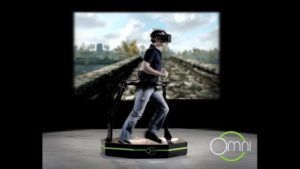2016 has been called the year that virtual reality becomes a reality, as some of the most anticipated devices will be made available on the consumer market. From Magic Leap (valued at over $1 billion) to Oculus (acquired by Facebook last year for $2 billion), there’s plenty of interest in the market, and ample room for it.
Though virtual reality is often depicted as an experience for the recliner or gaming chair, a number of VR enthusiasts want us to rethink how we engage with the technology. Instead of sitting around, they’d like to get us moving and looking beyond the go-to medium of gaming. Developers of these new devices consider fields like military training and healthcare as valuable places for mobile virtual reality to be applied.
Leading this approach is a Kickstarter VR company called Virtuix, whose treadmill-like device Omni encourages users to get upright and active. The reason to develop such a device felt like a natural evolution to Virtuix’s former Product Manager, Colton Jacobs.
Virtuix’s Omni“If I am walking in the virtual world my avatar is actually walking…”, he says, “…then the body’s natural reaction is, I want to stand up, I want to be walking with this avatar as if I’m actually there.”
Users first slip on a pair of Omni’s $60 slippery-bottomed shoes before stripping into a lower body harness, which allows them to shuffle and slide their feet over the surface of the device. The device looks like a treadmill, but the track doesn’t actually move; rather, the shuffling and sliding motions register on the track and translate into the VR program being used. Shuffle forward, and your character moves forward. Shuffle backward, and your character back pedals. The resulting movement is somewhat awkward looking from the outside, but a reportedly smooth and consistent experience for the user.
Engadget had a chance to try out the device earlier this year and gave a positive review: “Even the easy mode that I tried, wherein you fire where you look rather than where the gun is pointing – had my heart pounding.” Testing games like Doom and Call of Duty, Engadget reporter Andrew Tarantola recounts his experience:
“The generic ‘base defense’ shooter game that I tried blew me away. Having to actually move, turn, look around and aim was incredibly immersive and added a completely new level of gameplay. There’s no more sprint button. If you want to run faster, then you really have to run faster. I was sweating by the end of my session — and grinning harder than I have in years.”
Meanwhile, Jacobs describes Omni as an immersive experience like few others. Where your standard, handheld controls allow you to manipulate your character’s movement by toggling a joystick, Omni facilitates movement by mimicking the user’s movement.
“You can walk, run, jump, turn around 360 degrees and act out your virtual avatar’s motions. We’re doing motion tracking ourselves to the lower body so we’re going to be able to tell what direction you’re walking in and how fast you’re moving, jumping, side stepping, things like that and translate that into analog movement in the virtual world.”
Though he acknowledges gaming as the default medium for immersive VR devices, Jacobs envisions Omni’s technology applied beyond gaming.
“The gaming market is a great first adopter market for us,” he says. “That being said, we’ve had multiple orders for military installations, West Point Navy installations, where they’re doing training simulation for some emergency and disaster training… instead of sending soldiers out to the field, they can actually just do training for various types of scenarios in the virtual world together.”
By getting soldiers to actually act out the movement, they’re able to simulate the physicality of real-world scenarios more realistically than can be done with a hand-held controller.
Virtuix likely won’t stop with entertainment and military training. According to Jacobs, the company has looked into healthcare — particularly physical therapy and recovery – as a field that would greatly benefit from a device like Omni.
“We’ve had multiple universities around the world actually, go ahead and order the Omni and they’re looking to test it for various different rehabilitation, also research. Stroke survivors is one of our big ones. A traditional treadmill can get someone up and walking in a straight line but a lot of the dangers that they have when they’re walking around in their home or just walking in general is when they have to turn corners. When they have to go around an object, that’s when they have a higher fall risk. Our system could potentially help to reactivate those muscles after a major neurological attack like a stroke or Alzheimer’s.”
Though virtual reality is already used in healthcare, some ask why there isn’t hasn’t been more innovation in this area by the virtual reality industry. Perhaps Omni could be a useful bridge in moving the technology forward.
Of course, an important component in such applications is ensuring that the system is safe. After all, the thought of wearing a head mounted display (HMD) while sliding around a track sounds like an accident waiting to happen.
“Safety is definitely a top priority,” Jacobs says. “You can’t actually see your surroundings while you’re in the Omni. You need to be strapped in, make sure you’re safe, but you’re also standing on a frictionless surface. You have to watch a video of this to really understand, it’s very hard to say in words.”
But so far, Omni has stood up to the gaming obstacles, which speaks to potential opportunities for use in healthcare-type settings.
“With our harness and our safety support structure, we’ve never had anyone fall on the Omni, especially in a high-intensity gaming situation; it’s even more intense when there’s zombies flying at you.”
